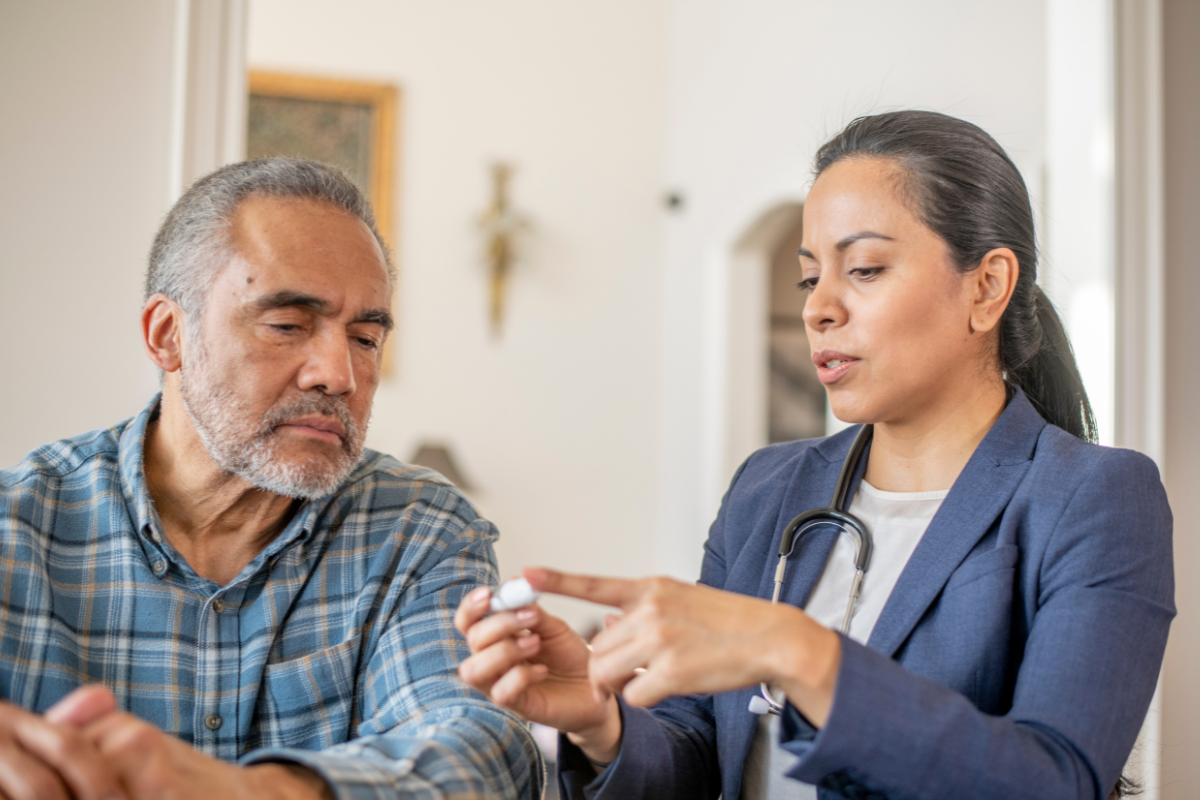Manage Your Blood Sugar Naturally
Hi everyone, this is Dr. Bell, and in this presentation, we're going to talk about reversing diabetes and ways that you can lower your glucose numbers. Diabetes is a Healthcare Crisis. 10 years ago, about 6% of the U.S. population suffered from diabetes. That number is now 10.5%. In other words, 1 in 10 people suffer from type two diabetes. Furthermore, about 7.3 million people are undiagnosed, which means they're walking around and they have no idea that they're diabetic. Another 88 million adults are pre-diabetic.
This disease is something that has a lot to do with lifestyle choices. The United States has one of the highest rates of obesity in our population. This obesity has led to a decline in our population’s overall health. The other scary thing is this – diabetes used to be called adult-onset diabetes. Now, however, so many adolescents and young adults are getting diabetes that we can no longer use this term.
The Problem is Getting Worse
Statistically, it looks like the issue is only getting worse. In 1985, there were approximately 30 million people globally that suffered from type 2 diabetes. By the year 2000, that number jumped to 150 million, and by the year 2030, the worldwide number of diabetics is predicted to be right around 500 million.
Western Medicine’s Role
Is Western medicine to blame for this crisis? I don't know. But what I do know is that Western medicine considers the disease first. It looks at one simple equation – what drugs do we need to give you so that we can mask or reduce the symptoms of your medical condition? And billions of dollars are spent every year to make you feel like this is the right approach.
When we look at medical issues like diabetes from the Western perspective – they’re considered “lifetime diseases”. Western medicine’s answer to lifetime diseases? Lifetime prescription drugs.
Diabetes: Myth #1 - Diabetes gets worse over time no matter what you do.
This leads us to debunk diabetic myth #1 – the idea that diabetes WILL get worse over time. We want you to know that diabetes doesn't have to get worse over time. Obviously, the best strategy is to prevent it from happening in the first place, but with the right plan of action, a diabetes diagnosis is manageable.
You do have to make some changes. As with any serious medical condition, if it's not properly addressed, then it is going to get worse over time. But you don't have to follow a conventional medicine approach with increasing regimens of medication. The CDC states that diabetes is controllable. They also state that diabetes is reversible, though there is currently no “cure”.
Nonetheless, it's possible to put diabetes into remission. Remember, however, that if you do fall back into your old habits, then you can just as easily become a diabetic again.
One of the most concerning factors about diabetes is that there are no obvious symptoms. There might be some things that are noticeable, but having diabetes isn't something that you necessarily “feel”. It's usually discovered on a blood test or through some sort of routine physical screening. This being said, knowing your risk factors is important.
The most obvious risk factor is going to be being overweight or suffering from obesity. Typically, the age of 45 years is considered the start of your greatest risk period. Our bodies start to age, we get less physically active, and then we aren’t burning enough calories or doing activities to keep our bodies’ circulation healthy.
Additionally, African-American, Hispanic or Latino, and Native American cultures seem to have a higher prevalence of diabetes compared to other cultures.
And last but certainly not least – if you eat what's called a “standard American diet” (SAD) – that's a diet that's high in vegetable oils, high in fat, low in vegetable consumption, and high in simple carbohydrates – that can put you at increased risk.
What do we see?
What will usually bring someone to the doctor is frequent urination or complaints of extreme thirst even while hydrated. Sometimes – no matter what they eat –they're constantly hungry.
Maybe their vision is blurred or they’re experiencing numb feet or neuropathy. Having dry skin or sores that don’t heal quickly – all of these issues can be indicators of type II diabetes.
Understanding Diabetes
Diabetes develops as a result of hormonal imbalance. The hormone insulin – which is produced in the pancreas – works to help process sugar in the body. When you have diabetes, your cells become resistant to insulin. Let’s break it down a bit more. Insulin acts like the key to a door. It helps to transport glucose into the cell. But the cell can only take so much glucose, and when we have overconsumption of carbohydrates, there’s more glucose than we actually need. At this point, the cells stop taking in glucose, and it builds up in the bloodstream.
This buildup of surplus “blood glucose” is toxic to our bodies. Our body finds a way to get rid of the toxicity by turning that sugar into fat and storing it. This is why diabetes and obesity are so closely related.
This process involves a huge amount of several different hormones in an attempt to maintain homeostasis or balance in the body. But our hormone supply isn't limitless. If we do push this to
the limit — which is typically what's happened in somebody that gets diagnosed as a type II diabetic — then we start to get some pretty major hormone imbalances.
Some of the hormones that can be affected for fat burning can be human growth hormone (HGH), Insulin, growth factor, glucagon, thyroid hormones, and testosterone.
Your fat-storing hormones are insulin, estrogen, and cortisol, and these hormones all have to maintain a delicate balance in our systems. If this system does get out of balance, then it does take some time for us to get these hormones back under control for you so we can start to lower those blood glucose numbers.
Diabetes Reversal
In reversing diabetes, it's important to know the numbers. That's how the treatments are usually geared. If you're a type II diabetic, generally your hemoglobin A1C goes above 6.5. That’s the standard “diagnosis” marker. But you can also have high fasting blood glucose and what's considered a fairly “normal” A1C. If your fasting blood glucose is higher than 126 then that's also an indicator that you might have type II diabetes.
To put diabetes into remission, your labs have to remain in a certain range. That range needs to be between 4.0 and 5.6. Your fasting blood glucose must also be between 65 and 99.
Diabetes Myth #2 - If I have diabetes, I’m just going to have to live with it.
What I want all of our patients to remember is that your lifestyle can almost always trump
genetics. I want to caveat – this is not necessarily the case if you're a type 1 diabetic. In the case of type 1 diabetics, some research studies have shown that there is a small genetic component. Typically, however, there's an illness, disease, or autoimmune issue that has caused the pancreas to stop producing insulin.
Conventional medicine believes there's more of a genetic component to type 2
diabetes, but it's not what you think. The reason I say that is this — while genetics probably do play a role, we also just talked about a second ago about hormonal imbalances. Our bodies
are sugar storage machines, and when there's excess sugar, we store it as fat. So really, every human being is genetically predisposed to diabetes and this isn't just unique to one person or one group of people.
The reason I say that it's genetic in this way is because it IS often a familial condition. But, in this familial sense, what I mean is that families tend to eat together, they tend to eat the same meals, and they tend to have the same habits. They could even be cultural habits that have been passed down from generations.
If the entire family eats pizza, soda, spaghetti, and fast food every day, then eventually that family is probably going to be overweight. This family is probably going to suffer from obesity and then be at greater risk for diabetes. The reality is that lifestyle is actually contributing to genetics. If you clean up your diet and lifestyle, then it's possible that you can reverse diabetes.
Diabetes Myth #3- As long as I take my meds, I’ll be fine.
Over time, most diabetics have ended up having to take more and more medication because their sugar numbers keep climbing. The main reason this happens is because the insulin sensitivity continues to persist and gets worse and so sugar continues to build up. Eventually, the pancreas can't keep up with the level of sugar and so most diabetics end up on insulin if they don't make the necessary diet or lifestyle changes. In a vicious cycle, patients can become resistant to medications and so the medications themselves can stop working. This is something that can be incredibly frustrating for patients when they're dealing with diabetes.
We've mentioned several times about diabetes and weight gain or obesity. This will be the same message – our bodies are programmed to store sugar as fat. Excess sugar is toxic, so your body has to eliminate the toxicities to keep you alive. So those excess sugar molecules get stored in fat cells as a protective mechanism.
Most people try to reduce their fat consumption and then struggle to lower their blood sugar and lose weight. Usually, it's because there's not a great alteration in the carbohydrate intake which allows the insulin sensitivity to continue. Until you get the insulin sensitivity under control, then it's going to be very difficult to lose weight.
Long-Term Impacts of Diabetes
Neuropathy
Earlier we mentioned neuropathy being one of the symptoms of diabetes. There are a few factors at play here. The number one cause of peripheral neuropathy is type 2 diabetes. The key to reducing the painful burning and tingling that patients experience when they suffer from neuropathy is to increase the amount of oxygen that's flowing to the feet.
This is done by lowering blood glucose. Oxygen and sugar molecules take up the same space in the red blood cell. When we have high blood glucose, we will have lower oxygen. So by lowering blood glucose, we can eventually get the oxygen levels up and that's what helps patients reduce the symptoms of neuropathy.
Another factor with neuropathy is having high cholesterol and triglycerides. This is one of the risk factors that we talked about. This will usually result in a patient being on what's called statin medication. The number two leading cause of neuropathy is taking a statin drug or a cholesterol-lowering drug.
The nerve is actually lined with cholesterol. If you strip that away, then that allows the nerves to essentially short-circuit themselves and they start to get shock-like pains and stinging pains because there's literally no covering on the nerve.
The number three cause of neuropathy is low back disc problems like degenerative disc disease and osteoarthritis. This is a very common condition in diabetics. These three complications can all be intertwined with each other, but generally, we see neuropathy as being one of the most common symptoms patients complain about when they become diabetic and live with diabetes for several years.
Peripheral Vascular Disease
Peripheral Vascular Disease – or peripheral arterial disease – is another complication of diabetes. The high level of blood glucose causes the blood vessel walls to weaken. This can cause the blood vessel walls to collapse. When this blood flow is reduced, the unoxygenated blood tends to pool in the extremities and we see swelling, pain, and discoloration. This can be incredibly dangerous because it does increase the risk factors for heart attack and stroke.
Heart Attack and Stroke
That leads us to our next complication of diabetes – heart attack and stroke. High cholesterol, high blood pressure, and vascular disease are risk factors for diabetes – but they also happen to be the same risk factors for heart attacks and strokes. That's why they also call heart attacks and strokes the silent killers – because you don't necessarily feel them until they're coming on.

Eye Disease
Eye Disease in general is common in our society – but you're more susceptible to eye disease if you are pre-diabetic or diabetic. Some of the conditions that are more common are retinopathy, macular edema, cataracts, and glaucoma.
High blood glucose can damage the blood vessels in the back of the eye, which can lead to these conditions. So if you are pre-diabetic or diabetic, it's very important you have your eyes checked regularly and make sure that you have your a1c, blood glucose, blood pressure, and cholesterol under control.
Diabetes and Family
Diabetes can place incredible burdens on families. If the disease gets really bad, some individuals require a caregiver. That caregiving responsibility often falls back on a spouse or even children. But it also prevents families from enjoying time together on vacations or even just going to simple events like a graduation for a grandchild.
If you get neuropathy, for example, it becomes very painful to walk, and that's usually one of the most common complications of diabetes. Due to the pain, it becomes hard to do simple tasks around the house. Sometimes it becomes hard to even just get out of bed.
We've heard countless stories of patients that come in and that one of the reasons they're motivated to come see us is because they're missing out on a graduation or they just stay in a hotel room or inside the cabin on the cruise that they went on because they couldn't stand, they couldn't walk, and they couldn't do the things that they wanted to do.
If this does lead to an unfortunate heart attack or a stroke, sometimes the length of recovery is months, or years, or you may never recover at all, which can place even larger burdens on families.
Diabetes and Death
Diabetes cuts the life expectancy on average by about 13 years – with men being affected more than women. Also, the younger you get diabetes, the greater the chances are that you'll suffer from loss of life. In 2019, diabetes was the seventh leading cause of death and it accounted for 87 out of every 640 deaths.
But, as we've talked about, diabetes is a preventable and reversible disease. We feel it's very important that we take the steps to educate patients about preventing or reversing their diabetes naturally and safely – without just taking drugs to reduce or manage the symptoms.
Insulin and Diabetes
We've talked several times about how diabetes is essentially an insulin problem. Remember that insulin is what regulates blood glucose, and that's what helps it get into the cells. The foods you eat – mainly carbohydrates and proteins – are broken down into sugar. When this happens, insulin is the signal to the liver to store sugar for later use. Insulin will also help transport sugar into the cells for storage and energy.
But what happens if the liver and the cells become full of glucose? It starts to build up in the bloodstream and the normal level of insulin now is not able to move glucose where it needs to go. The pancreas responds by making even more insulin, but more insulin isn't going to solve the problem. This is when you start to become a type 2 diabetic.
This also may help to explain why medication may not be the best answer. Yes, the medication will temporarily reduce blood sugar and the sugar numbers will come down because glucose is being artificially forced into the cells. But as the sugar builds up, it's going to take more and more medication to keep stuffing glucose into the cells. Since more insulin doesn't solve the problem, medication needs to increase over time.
Really, the trick with defending against diabetes is to figure out a way to burn off the stored glucose. Doing things like reducing carbohydrate intake as well as exercising and figuring out ways to burn the glucose is the best defense.
Vitality Integrative Wellness
Our practice is called Vitality Integrative Wellness – and the reason we named our practice that is because that's the approach we take with patients. We take an integrative approach that combines Western medical treatments and medical therapies with alternative as well as Eastern medical philosophies. This allows patients to be proactive with their health and not reactive to their health. This puts the patient in control of their health, and it also helps us educate patients to learn to listen to their bodies and take control of those things that they need to improve their health. We seek to find the root cause of your health, and we want you to function in a way that you no longer have to treat symptoms.
Blood Sugar Transformation Process

If your sugar numbers are too high or your doctor is telling you that your a1c is at a dangerous level, then there are solutions that you can take to reverse that and get your numbers heading in the right direction. We would love to have you book a consultation with our office so we can explain to you our natural approach in better detail. Please give our new patient coordinator a call at 951-4419.
Many people suffer from abnormal blood glucose numbers or high a1c, so if your spouse, friends, or family members are also suffering from these types of issues, we certainly would love to talk to them as well. You can check us out on the web at www.growwithvitality.com, and we're also on social media on Facebook and Instagram at Vitality Integrative Wellness.
We look forward to seeing you in the office very soon!


